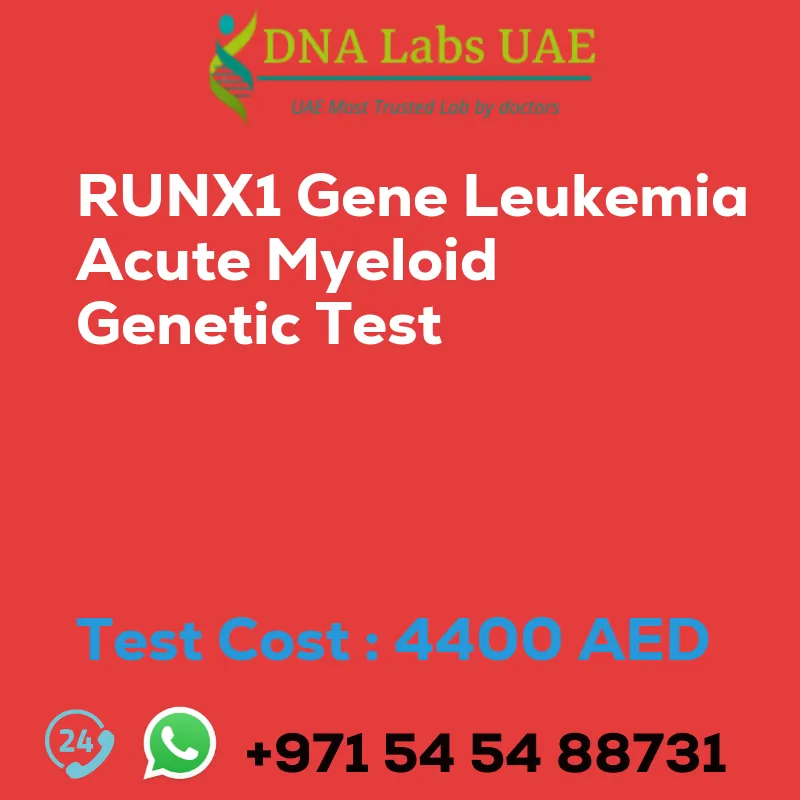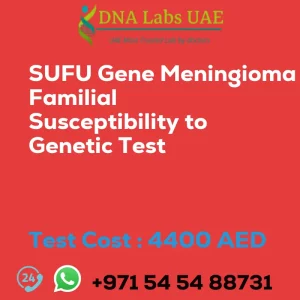RUNX1 Gene Leukemia Acute Myeloid Genetic Test
Welcome to DNA Labs UAE’s blog! In this article, we will discuss the RUNX1 Gene Leukemia Acute Myeloid Genetic Test and its cost, symptoms, diagnosis, and other important details.
Test Name: RUNX1 Gene Leukemia Acute Myeloid Genetic Test
Components: Blood or Extracted DNA or One drop Blood on FTA Card
Price: 4400.0 AED
Report Delivery: 3 to 4 Weeks
Method: NGS Technology
Test Type: Cancer
Doctor: Oncologist
Test Department: Genetics
Pre Test Information
Before undergoing the RUNX1 Gene Leukemia Acute Myeloid Genetic Test, it is important to provide the clinical history of the patient. Additionally, a genetic counseling session may be conducted to draw a pedigree chart of family members affected by the RUNX1 Gene Leukemia.
Test Details
The RUNX1 gene is a transcription factor that plays a critical role in the development of blood cells. Mutations in the RUNX1 gene have been associated with an increased risk of developing certain types of leukemia, including acute myeloid leukemia (AML).
NGS (Next-Generation Sequencing) genetic testing is a type of genetic test that allows for the simultaneous analysis of multiple genes. It uses advanced sequencing technology to quickly and accurately sequence large amounts of DNA. NGS genetic testing can identify mutations or changes in the DNA sequence of the RUNX1 gene and other genes associated with leukemia.
In the context of acute myeloid leukemia, NGS genetic testing can be used for the following purposes:
- Diagnose AML: By analyzing the DNA sequence of the RUNX1 gene and other relevant genes, NGS testing can help confirm a diagnosis of AML and identify specific genetic mutations that may be driving the development of the disease.
- Predict prognosis: Certain genetic mutations in the RUNX1 gene and other genes have been associated with different outcomes and treatment responses in AML. NGS testing can help determine the prognosis and guide treatment decisions for individuals with AML.
- Guide treatment decisions: Some genetic mutations in the RUNX1 gene and other genes are associated with specific targeted therapies or treatment strategies. NGS testing can identify these mutations, allowing for more personalized treatment approaches.
- Monitor disease progression: NGS testing can be used to monitor changes in the genetic profile of AML over time. This information can help guide treatment decisions and assess treatment response.
It is important to note that NGS genetic testing is typically performed by a specialized laboratory and requires a blood or bone marrow sample from the individual undergoing testing. The results of the test should be interpreted by a qualified healthcare professional with expertise in genetics and leukemia.
| Test Name | RUNX1 Gene Leukemia acute myeloid Genetic Test |
|---|---|
| Components | |
| Price | 4400.0 AED |
| Sample Condition | Blood or Extracted DNA or One drop Blood on FTA Card |
| Report Delivery | 3 to 4 Weeks |
| Method | NGS Technology |
| Test type | Cancer |
| Doctor | Oncologist |
| Test Department: | Genetics |
| Pre Test Information | Clinical History of Patient who is going for RUNX1 Gene Leukemia, acute myeloid NGS Genetic DNA Test. A Genetic Counselling session to draw a pedigree chart of family members affected with RUNX1 Gene Leukemia, acute myeloid NGS Genetic DNA Test gene RUNX1 |
| Test Details |
The RUNX1 gene is a transcription factor that plays a critical role in the development of blood cells. Mutations in the RUNX1 gene have been associated with an increased risk of developing certain types of leukemia, including acute myeloid leukemia (AML). NGS (Next-Generation Sequencing) genetic testing is a type of genetic test that allows for the simultaneous analysis of multiple genes. It uses advanced sequencing technology to quickly and accurately sequence large amounts of DNA. NGS genetic testing can identify mutations or changes in the DNA sequence of the RUNX1 gene and other genes associated with leukemia. In the context of acute myeloid leukemia, NGS genetic testing can be used to: 1. Diagnose AML: By analyzing the DNA sequence of the RUNX1 gene and other relevant genes, NGS testing can help confirm a diagnosis of AML and identify specific genetic mutations that may be driving the development of the disease. 2. Predict prognosis: Certain genetic mutations in the RUNX1 gene and other genes have been associated with different outcomes and treatment responses in AML. NGS testing can help determine the prognosis and guide treatment decisions for individuals with AML. 3. Guide treatment decisions: Some genetic mutations in the RUNX1 gene and other genes are associated with specific targeted therapies or treatment strategies. NGS testing can identify these mutations, allowing for more personalized treatment approaches. 4. Monitor disease progression: NGS testing can be used to monitor changes in the genetic profile of AML over time. This information can help guide treatment decisions and assess treatment response. It is important to note that NGS genetic testing is typically performed by a specialized laboratory and requires a blood or bone marrow sample from the individual undergoing testing. The results of the test should be interpreted by a qualified healthcare professional with expertise in genetics and leukemia. |







